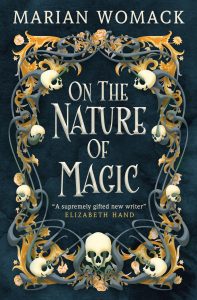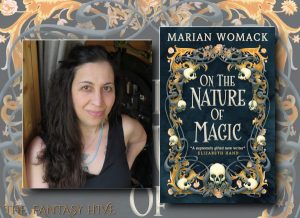Author Spotlight: Marian Womack (ON THE NATURE OF MAGIC)
Marian Womack is a bilingual writer of Gothic, Weird and Science Fiction. Her writing features strange landscapes, ghostly encounters and uncanny transformations. She has published the Andalusia-set novel The Swimmers (2021), selected as one of the best ten SF books of 2021 by The Sunday Times. She is also the author of the Walton & Waltraud uncanny mystery series, which includes The Golden Key (2020), On the Nature of Magic (2023), and the forthcoming Casting the Ruins (2024). Her short fiction has been collected in Lost Objects (2018), nominated to two British Fantasy Awards and one British Science Fiction Association Award, and in the forthcoming Out Through The Window, Into The Dark. She lives in East Anglia and works as a librarian.
Writing this book has really been so much fun, and I hope that is something the reader can sense. It’s the second adventure for Helena and Eliza, two detectives in early twentieth-century London. The premise of the first book is that Helena pretends to be a medium in order to do detective work, until of course she stumbles upon the supernatural, including her own powers, whereas Eliza is an amateur scientist/sceptic who has trouble accepting Helena’s world. This new adventure is more ambitious, involving time-slips, strange machines, and supernatural powers that are difficult to interact with and be controlled by humans. All this against the backdrop of occult Paris and early French cinema. I really feel it is a development from The Golden Key, a much richer foray into Helena and Eliza’s world. There are other women joining forces with them as well—I really wanted to give them a Scooby-gang. There is George Méliès, and Alice Guy, and Nicola Tesla. There is magic—or is it science?—the eerie and slippery kind. The book revolves around a team of fierce women trying very hard to keep things in order in a world that, needless to say, does not always thank them, or even acknowledge them.
Tell us a little something about your writing process – do you have a certain method? Do you find music helps? Give us a glimpse into your world!
I’ve always been involved in art projects parallel to my writing, and I find that it really helps my process if I can walk away from the writing for a bit and do a collage, or work with my Victorian Columbian printing press, or sew a book—I have recently taken up bookbinding and have become quite addicted. For the past few years, since the pandemic especially, I have noticed I need these craft-y outlets much more to keep the writing going. Perhaps this is because my current WIP has taken me down very dark rabbit-holes at times, and I’ve had to take long breaks from it from time to time. And yes, there is always music in our house. We are a very musical family: my brother plays in not one but three bands! I am an obsessive Joanna Newsom fan, read her lyrics as if they were poetry; which they are. And I have a soft spot for Tori Amos. Her music came into my life when I was a teenager living in Andalusia, and she was so different from absolutely everything around me, and at once so oddly removed from my experience while speaking directly to it. I remember listening to Boys for Pele as if it were a religious experience. Those two are always in the background, so much so they even made it to the book’s acknowledgements. Then there are always albums that inspire me when I am writing: alternative bands, flamenco, and folk music. Cuban singer-songwriter Silvio Rodríguez gives me enough energy to carry me past a writer’s block, every single time. My current WIP involves folk music as part of the magic system, so I’ve been listening to loads of English folk music in the past few years, so much so I feel I could write a thesis about it. The book would simply not exist without those songs.
Speaking of worlds, what inspires your worldbuilding? Do you have a magic system/s? If so, can you tell us a bit about it?
I’m always trying to portray very subtle, liminal moments of ‘magic’, I love my characters, and my readers, not knowing exactly what has happened. Was that a supernatural moment, an occult occurrence? Or did nothing remarkable happen? Perhaps it is because I am, and always will be, a child of the Gothic, with its trope of terrors that could be imaginary. One of my favourite novels is The Course of the Heart. That, to me, is utter perfection. The absolute moments of darkness that are so subtly handled, which makes it all the more horrid, of course. I am in awe of that.
What (or who) are your most significant fantasy/sci-fi influences? Are there any creators whom you dream of working with someday?
I just mentioned M. John Harrison. I am also a huge fan of both Nina Allan and Lisa Tuttle. I was incredibly lucky to publish them both in Spanish translation when I worked in publishing in Madrid, which was a privilege. I absolutely adore Spanish poet and novelist Sofia Rhei—she has had some of her work translated into English, so you can check her out! We collaborated in a YA Steampunk novel back in Spain, and are now writing a Tarot together. Elizabeth Hand is also up there as someone I am always reading and re-reading, perhaps even trying to emulate. Then, as well as authors, there are presses, editorial lists one looks at and feels what an honour would be to be part of. I experienced a huge fan-girl moment when I discovered Unsung. I was still living in Spain when I read their first books; I remember reading The Beauty and having an instant moment of recognition: those were the books that I wanted to be writing. The same happened when I discovered Undertow. It has been an honour to make it to a couple of their anthologies, a Year’s Best Weird Fiction and their lovely The Silent Garden: A Journal of Esoteric Fabulism. I feel that independent publishers, putting together those editorial lists that are so personal, so incredibly well-crafted, are also creators, their lists themselves communicating a story and an imaginary. And then there are artists I adore. I publish the fiction of artist Charlotte Cory, and doing any sort of collaboration with her would be incredible. We are role-players and table-top gamers at home, and I would love to write for or collaborate with any of those, in some shape or form. Which girl who has been a dungeon master doesn’t want to write D&D professionally one day?

We see such varying opinions from authors when it comes to the time of editing their books. How have you found the editing process? Enjoyable, stressful or satisfying?
I’ve been extremely lucky in my editor. She completely gets my stories, my characters, my process. The moment of stress is always there when you open the notes and suggestions, but I cannot deny it: my editor has made my books 100 times better, and I am so thankful for her keen eye, dedication and patience with me.
We always appreciate a beautiful book cover! How involved in the process were you? Was there a particular aesthetic you hoped they’d portray?
I cannot say I have been very involved; although the suggestions are always sent my way, which is very courteous. But in the end that is a part of the process I have less input with.
Can you tell us a bit more about your characters? Do you have a favourite type of character you enjoy writing?
My favourite character at the moment is one I call ‘cute-emo-guy’; sadly he belongs to my WIP! However, both Helena and Eliza have been wonderful to write. They have led me to unexpected places. Eliza started off as a sidekick, and she ended up as the protagonist of the second book, I could not resist her! It is a wonderful experience to be able to engage with your characters during more than one book, and to explore further where they can go. Then again, I love writing the Gothic heroine who is not sure if she is experiencing the Occult or imagining it… That is a journey I never tire from.
The world shifts, and you find yourself with an extra day on your hands during which you’re not allowed to write. How do you choose to spend the day?
Probably working with my printing press, or heading to London to second-hand bookshops—if there is a PBFA fair near to Cambridge I will be there—or else to a museum. I am quite a museum nerd; I like writing about museums in my fiction, almost as much as I like writing about libraries. If I wasn’t a librarian I would work in a museum.
One of our favourite questions here on the Fantasy Hive: which fantastical creature would you ride into battle and why?
I have to write a dinosaur here or my three-year-old daughter will kill me.
Ed: HA! I have an eight-year-old like that.
Tell us about a book you love. Any hidden gems?
So many! I co-run a tiny micro-press where I indulge in artists books and little weird things I love, and we are publishing an English version of an absolute gem, The Topless Tower by Argentinian writer Silvina Ocampo. I can best describe it as a surrealist novella that is a cross between Alice in Wonderland and The Master and Margarita—two of my favourite books—so yes, it is ripe for re-discovery, I hope.
Can you tell us a little something about your current work(s) in progress? Have you any upcoming projects which you can share?
I am currently revising the hardest novel I have ever written, and by far the most important to me. It’s about the scandal of stolen babies in Franco’s Spain. This has proved a particularly hard topic; the writing process has at times taken me to a very dark place. It would have been impossible for me to engage in any way or form with this topic if I had not explored it through the lens of speculative fiction, of fantasy. The novel started as one thing, and it has ended up taking the shape of a horror, dark academia novel, the last thing I expected when I first sat down to it three years ago. It involves doubles, convent schools and Santas Incorruptas, a sort of scary witchy-Catholic figure/demon, and music, a load of folk music. And Robert Graves and Laura Riding, strangely enough. I promise you it all makes sense in my head!
Ed: It sounds fantastic, and also it sounds a very important story to be told.
Are you planning anything fun to celebrate your new release? Do you have any upcoming virtual events our readers may be interested in?
I am attending FantasyCon this year, which I am really excited about. I know this sounds so far away in time; but to be honest time has been weird for me since the pandemic, so to me it is pretty much around the corner. I will have a little dealer table with my micro-press, so I am hoping that readers of Helena and Eliza’s adventures will come and say hello to me there.
Finally, what is the one thing you hope readers take away from your writing?
I probably have got many things wrong, and things have not always gone like I expected or wanted. But I’ve kept trying to write the books I wanted to read, and therefore to share with others. Hopefully some of them will be a fun read for someone.
Thank you so much for joining us today!
On the Nature of Magic is out today from Titan Books! You can pick up your copy HERE

